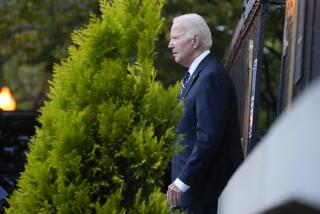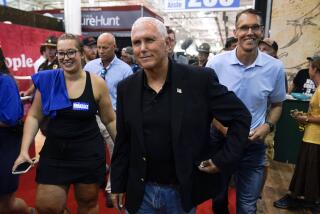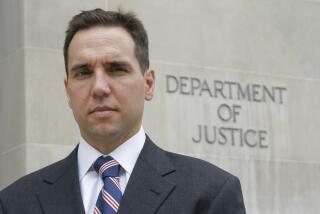Clinton Orders Probe Into Aide’s Death : White House: Deputy Counsel Vince Foster’s office is sealed prior to search by federal agents. Officials call his apparent suicide ‘inexplicable.’
- Share via
WASHINGTON — President Clinton has ordered a top-level Justice Department investigation into the apparent suicide Tuesday evening of his childhood friend and White House deputy counsel, Vince Foster.
White House officials described Foster’s death by gunshot as “inexplicable” but said that they have no reason to believe it was other than a suicide.
However, his White House office was quickly sealed and will be searched by federal agents this morning for any material that might bear on his death.
Clinton canceled the public events on his schedule Wednesday, but went through with two meetings with lawmakers to push his economic program. Lawmakers said he was somewhat distracted and weary from a largely sleepless night.
Foster, 48, left no note, and none of his friends or associates said that they had any clue that he was despondent or contemplating taking his life. Some White House colleagues said that they found him somewhat more withdrawn than usual in the last few weeks, but that they were not alarmed by any comments or behavior.
Foster left his White House office after lunching at his desk on Tuesday and did not return. He apparently drove to a secluded federal park in Virginia overlooking the Potomac River, where his body was discovered shortly after 6 p.m. with a single gunshot wound to the head and a .38-caliber revolver in his hand.
Clinton, mourning his friend of more than 40 years, told White House staff members in an emotional meeting Wednesday, “No one can ever know why this happened. . . . What happened was a mystery about something inside of him. And I hope all of you will always understand that.”
The President rejected suggestions that Foster’s role in several bungled personnel appointments and the scandal arising from the firings of seven White House travel office aides had anything to do with his death.
“I certainly don’t think that can explain it,” Clinton said in a brief appearance before reporters. “I certainly don’t think it’s accurate.”
White House Chief of Staff Thomas (Mack) McLarty, who attended kindergarten in Hope, Ark., with Clinton and Foster, was near tears while delivering a statement Wednesday afternoon on Foster’s death.
“We can never fully know a person’s private pains,” McLarty said. “The White House has lost a talented and dedicated attorney.”
Foster’s body was found at 6:15 p.m. Tuesday resting not far from a Civil War-era cannon at Ft. Marcy, on a bluff above the Potomac in McLean, Va., according to Maj. Robert Hines of the U.S. Park Police, which has jurisdiction over federal parklands. A Fairfax County fire and rescue unit notified the Park Police after receiving a report of a gunshot at the park.
There was no identification on the body, but police found a suit jacket matching the victim’s pants in an unlocked car parked about 200 yards away. The jacket contained Foster’s car keys, his wallet and his White House identification badge.
The Park Police filed a preliminary report listing the death as a probable suicide, and a later Fairfax County medical examiner’s report said that the “deceased succumbed to a gunshot wound not inconsistent with a self-inflicted wound.” The Park Police called White House security agents with a report that a White House official had been found dead. Security director Craig Livingstone and associate counsel William Kennedy III, a longtime friend and former law partner of Foster’s, went to Fairfax Hospital to identify the body.
McLarty received an unconfirmed report of Foster’s death at 9:10 p.m., while Clinton was appearing on CNN’s “Larry King Live” program. McLarty called Hillary Rodham Clinton in Little Rock, Ark., with the preliminary report. At 9:55 p.m., the death was confirmed and McLarty cut short Clinton’s planned 90-minute television appearance by half an hour.
The two friends went to the private quarters of the White House, where McLarty told the President of the tragedy.
Clinton, McLarty and a number of other Foster friends then went to Foster’s Northwest Washington home to console his widow, Lisa, and other family members. “We all shared some warm and some wonderful memories as well as shed some very real tears,” McLarty said.
Deputy Atty. Gen. Philip B. Heymann will oversee the inquiry into Foster’s death. He has assigned two Justice Department attorneys to supervise the FBI-Park Service investigation, in part to assure that nothing considered to be privileged information between the President and the counsel’s office is revealed.
If there is any evidence of foul play, the FBI will take over the inquiry from the Park Service under laws governing the murder of a federal official, Justice Department officials said.
Officials could offer no theory on why Foster might have wanted to kill himself. The limited public criticism he did receive in Washington over his relatively small role in the travel office scandal was less harsh than that visited upon the President and many other White House aides.
Four aides were publicly reprimanded for their actions in the scandal, but Foster was not among them.
Foster’s chief role in the travel office events appeared to be to keep Mrs. Clinton, his former law partner and friend of 20 years, apprised of the progress of the investigation into alleged bookkeeping irregularities. But the FBI is continuing to look into the matter and Foster may have been aware of additional information that has not yet come to light.
Foster’s boss, Counsel Bernard Nussbaum, has come under fire repeatedly for poor staff work on nominations, including the failed appointments of Zoe Baird, who was Clinton’s first nominee to be attorney general; Kimba M. Wood, who was subsequently considered for the post, and C. Lani Guinier, who was nominated as assistant attorney general for civil rights.
Clinton told the White House staff that the first six months of his presidency have been stressful for everybody and many others may have had problems that seemed worse than Foster’s.
“Even if you had a whole set of objective reasons, that wouldn’t be why it happened, because you could get a different, bigger, more burdensome set of objective reasons that are on someone else even in this room,” Clinton said.
Clinton encouraged the staff “to remember that we’re all people and that we have to pay maybe a little more attention to our friends and our families and our co-workers and try to remember that work cannot be the only thing in life.
“And a little humility in the face of this can be very, very important,” Clinton said.
“It’s very important his life not be judged simply by the way it ended, because Vince Foster was a wonderful man,” said Clinton, adding: “We have to go on. We have the country’s business to do.”
Foster was, by all accounts, a generous friend and a polished attorney. He graduated first in his class at the University of Arkansas Law School in 1971 and achieved the highest score on the state bar exam that year.
He was a partner of Mrs. Clinton at Little Rock’s prestigious Rose Law Firm. His colleagues there said that he was a dogged litigator, active in Little Rock civic and charitable affairs and one of the most popular members of the firm.
More to Read
Sign up for Essential California
The most important California stories and recommendations in your inbox every morning.
You may occasionally receive promotional content from the Los Angeles Times.










